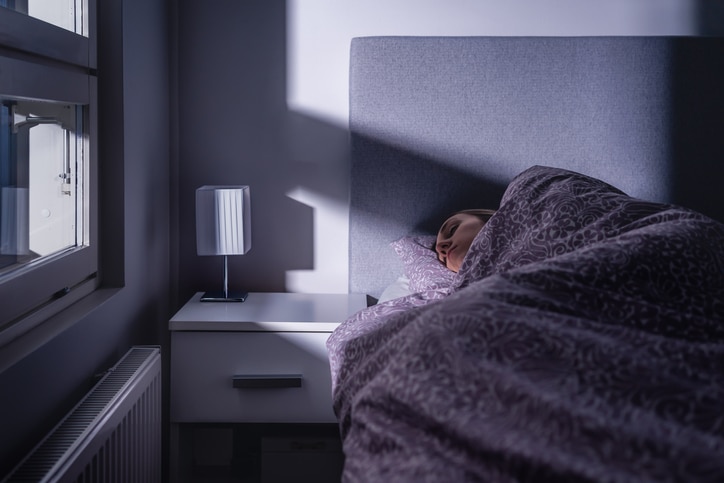Sleep. It’s one of life’s simple pleasures, and yet it can be so elusive for many of us. Whether it’s due to stress, a restless mind, or an uncomfortable sleeping environment, a good night’s sleep can sometimes feel like an impossible dream. Today, let’s talk about one factor that plays a significant role in how well we sleep – temperature. Specifically, the pros and cons of sleeping in a cold room.
Summary: Pros and Cons of Sleeping in a Cold Room
Sleeping in a cold room can have several benefits including helping you fall asleep faster, achieving a deeper and more restful sleep, boosting melatonin production, aiding in weight loss, and benefiting skin and hair health. However, there are also potential downsides like increased blood pressure, potential respiratory problems, discomfort, and disturbed sleep. While sleeping in a cold room doesn’t directly cause sickness, it can potentially stress a body that’s already ill. Creating a cooler sleeping environment can involve using an air conditioner, opening a window, using fans, investing in cooling bedding, or even sleeping without clothing. As always, individual comfort levels should dictate your optimal sleeping temperature for a good night’s sleep.

Is It Good to Sleep in a Cold Bedroom?
From our childhood, we’ve all heard a variation of the adage: “Keep warm, get enough sleep, and you’ll grow big and strong.” But is that all there is to it? What happens when we flip the script and turn down the thermostat instead? Well, new ground-breaking conclusions drawn from recent studies suggest that a cooler room might actually be the key to a better night’s sleep.
Our body temperature naturally dips at night as a part of our sleep cycle. By creating an environment that mimics this natural process, we help our bodies understand that it’s time to hit the sack. However, it’s not as straightforward as cranking up the AC and calling it a night. As with everything else in life, there are pros and cons to sleeping in a cold room.
What is the Optimal Room Temperature for Sleep?
Achieving the optimal room temperature for sleep is crucial to a good night’s rest. Not only does it affect your ability to fall asleep, but it can also impact the quality of your sleep. So what is the optimal room temperature for sleep, and why does it matter? Let’s explore.
The optimal room temperature for sleep is between 16-18°C (60-65°F) as it supports our body’s natural cooling process.
Why Room Temperature Matters
Our bodies are designed to naturally drop in temperature as we prepare for sleep. If the room is too warm, our body’s natural cooling process is interrupted and can cause us to wake up frequently throughout the night. Additionally, if the room is too cold, we may have trouble falling asleep or staying asleep as our body tries to warm up.
Sleep Quality and Temperature
Temperature plays an integral role in the quality of our sleep. Even a few degrees off the optimal temperature range can impact how well we sleep. If the room is too hot, we may experience sweating, discomfort, and wakefulness, which could lead to a decrease in sleep quality. On the other hand, if the room is too cold, we may struggle to fall asleep and stay asleep as our body tries to stay warm.
Health Effects of Sleeping in a Room with Poor Temperature
Sleeping in a room that is too hot or too cold can also affect our health. Exposure to extreme temperatures can lead to dehydration, which may cause dryness of the skin and mucous membranes. Additionally, it can negatively impact the immune system, making us more susceptible to various infections.
Sleeping in a Cold Room – Benefits
Fall Asleep Faster
Have you ever tossed and turned on a hot summer’s night, feeling more awake with each passing minute? There’s a reason for that. Our bodies prefer a cooler environment for sleep. By lowering the temperature of your room, you help your body reach its optimal sleep temperature faster. This can help you fall asleep quicker, especially on those restless nights when sleep seems like a far-off dream.
Read also: Tips for getting to sleep quickly.
Deeper Sleep
When your room is cool, your body doesn’t have to work hard to regulate its temperature. This allows you to achieve a deeper sleep, or rapid eye movement (REM sleep), which is essential for feeling rested and rejuvenated in the morning. In REM sleep, our brains are almost as active as when we are awake, processing the day’s information and cementing it into memory.
Boosts Melatonin Production
Melatonin, often referred to as the “sleep hormone,” is produced in the pineal gland and is responsible for regulating our sleep-wake cycle. Cooler temperatures can help boost melatonin production, helping us not only fall asleep faster but also achieve a more restful sleep. More melatonin also means feeling more refreshed when we wake up – and who doesn’t want to start their day off feeling on top of the world?
Promotes Caloric Burn and Weight Loss
Here’s a surprising health benefit of sleeping in a cold room – it might help you lose weight! It turns out that our bodies burn more calories to stay maintain body heat in a cooler environment. Additionally, cooler temperatures can stimulate the production of brown fat, a type of fat that burns energy to generate heat in the human body. So, while it’s not a substitute for a balanced diet and regular exercise, sleeping in a cold room might give your weight loss efforts a slight boost.
Good for Skin and Hair
You know that dry, lackluster feeling your skin has after a night in a heated room? You can say goodbye to that when you sleep in a cold room. Cooler environments can help reduce the dryness and irritation caused by hot, stuffy rooms. Plus, cold temperatures can also prevent hair from becoming dehydrated, keeping your locks shiny and healthy.
Dangers of Sleeping in a Cold Room
While there are many benefits to sleeping in a cold room, it’s not all sunshine and rainbows. There are a few potential downsides that you should be aware of before you decide to turn your bedroom into an icebox.
Increased Blood Pressure
In colder conditions, our bodies work harder to stay warm, which can lead to an increase in blood pressure. While this might not be a problem for most people, if you have a pre-existing heart condition, it might be best to consult your doctor before making any drastic changes to your sleeping environment.
Respiratory Problems
Cold, dry air can irritate the airways, especially for those with asthma or other respiratory conditions. It’s crucial to strike a balance – while a room that’s too hot might make it hard to sleep, a room that’s too cold could have you reaching for the inhaler.
Discomfort and Disturbed Sleep
If the room’s temperature is excessively cold, it might actually make you uncomfortable and cause you to wake up and have a restless night. However, shivering and feeling chilled is hardly conducive to a good night’s sleep, so it’s essential to ensure that while your room is cool, it’s not uncomfortably so.
Can Sleeping in a Cold Room Make You Sick?
It’s a common belief that sleeping in a cold room can make you sick, but this isn’t entirely accurate. Cold viruses thrive in cooler temperatures, and our immune response is less efficient in the cold. However, it’s exposure to the virus itself, rather than simply a cold environment, that makes you sick.
That said, if you’re already ill, it might be a good idea to sleep in a room that’s a bit warmer than usual. This can help your body conserve energy for its immune response, instead of using it to keep warm.
Is It Easier to Sleep in a Cold Room?
For most people, yes. As mentioned earlier, cooler temperatures can help you fall asleep faster and enjoy a deeper, sound sleep. However, it’s essential to remember that we’re all unique, and what works for one person might not work for another.
Why Do I Like Sleeping in a Cold Room?
The answer to this lies in our human biology. As we prepare for sleep, our body temperature drops slightly, signaling to our brain that it’s time to rest. By sleeping in a cold room, we’re essentially helping this natural process along.
There’s also something incredibly cozy about snuggling under a warm blanket in a cool room, isn’t there?
Read also: Why can’t I sleep without a blanket?
How to Make Your Room Colder at Night
So, how do you go about creating this cooler sleeping environment? Here are some practical tips:
Air Conditioner:
This is perhaps the most obvious solution. If you’re fortunate to live in a place where air conditioners are commonplace, this can be a convenient way to control your bedroom temperature.
Open a Window:
If an air conditioner isn’t an option, consider simply opening a window. This can help circulate the air in your room, lowering the temperature. Plus, the white noise of the outdoors can be an added bonus for some people.
Read also: Is it bad to sleep with the window open?
Fans:
A good old-fashioned fan can also do the trick. While it doesn’t actually cool the air, a fan can make your room feel cooler by circulating the air and helping with sweat evaporation.
Read also: Can you sleep with a fan and a humidifier on?
Cooling Bedding:
Consider investing in bedding made from breathable, natural fibers. These can help wick away sweat, keeping you cool throughout the night.
Read also: Is bamboo linen cooling?
Sleep Without Clothing:
This might not be everyone’s cup of tea, but sleeping without clothes can be a great way to keep cool. If you’re not comfortable with that, opt for loose, lightweight pajamas.
Read also: Is it good to sleep without underwear?
Is It Better to Sleep in a Warm or Cold Room When Sick?
When we’re sick, our body is already working overtime to fight off infection. Sleeping in a cooler room might cause your body to use more energy to keep warm, which can slow down the recovery process. So, while a cold room can often promote better sleep, when you’re unwell, it might be best to keep things a bit warmer.
Conclusion: Pros and Cons of Sleeping in a Cold Room
The pros and cons of sleeping in a cold room have been well explored in this piece. From the benefits of deeper sleep, more melatonin, and even the potential to lose weight, to the downsides like increased blood pressure and potential discomfort, we’ve covered a lot of ground.
The key to remember here is balance. Extreme temperatures, whether hot or cold, can disrupt our sleep. Finding the best temperature that allows you to enjoy a restful night’s sleep is the real goal.
So, go ahead. Experiment with your bedroom temperature. Maybe even dare to sleep naked if you haven’t tried it before. Remember, the goal is to wake up feeling rested and rejuvenated. If a cool room can help you do that, why not give it a try?
Ultimately, good sleep hygiene is about more than just temperature. It’s about creating a calming bedtime routine, keeping regular sleep hours, and ensuring your sleeping environment is dark, quiet, and comfortable.
